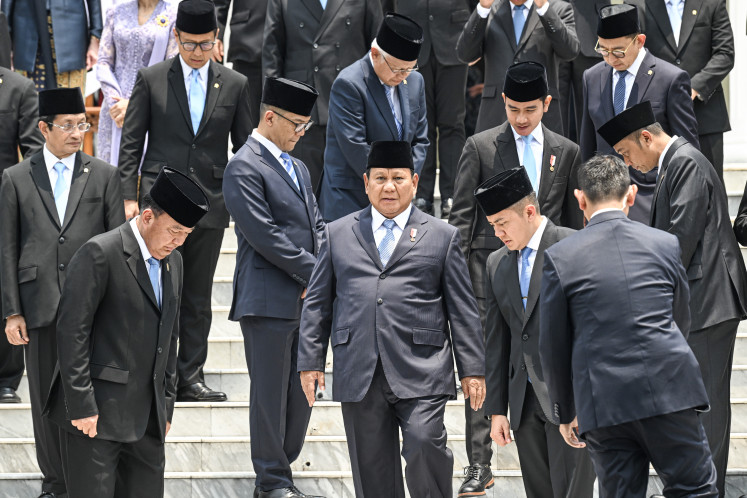Popular Reads
Top Results
Can't find what you're looking for?
View all search resultsPopular Reads
Top Results
Can't find what you're looking for?
View all search resultsRI should focus on e-economy study: Djisman
Cap and gown: Distinguished economist Prof
Change text size
Gift Premium Articles
to Anyone
 Cap and gown: Distinguished economist Prof. Djisman Simanjuntak (front left), accompanied by fellow members of the academic faculty of Prasetya Mulya Business School (STIE), arrives at the graduation venue in South Tangerang, Banten, on Tuesday. During the ceremony, 647 undergraduate and graduate students were awarded their degrees.(JP/DON) (front left), accompanied by fellow members of the academic faculty of Prasetya Mulya Business School (STIE), arrives at the graduation venue in South Tangerang, Banten, on Tuesday. During the ceremony, 647 undergraduate and graduate students were awarded their degrees.(JP/DON)
Cap and gown: Distinguished economist Prof. Djisman Simanjuntak (front left), accompanied by fellow members of the academic faculty of Prasetya Mulya Business School (STIE), arrives at the graduation venue in South Tangerang, Banten, on Tuesday. During the ceremony, 647 undergraduate and graduate students were awarded their degrees.(JP/DON) (front left), accompanied by fellow members of the academic faculty of Prasetya Mulya Business School (STIE), arrives at the graduation venue in South Tangerang, Banten, on Tuesday. During the ceremony, 647 undergraduate and graduate students were awarded their degrees.(JP/DON)
C
span class="caption">Cap and gown: Distinguished economist Prof. Djisman Simanjuntak (front left), accompanied by fellow members of the academic faculty of Prasetya Mulya Business School (STIE), arrives at the graduation venue in South Tangerang, Banten, on Tuesday. During the ceremony, 647 undergraduate and graduate students were awarded their degrees.(JP/DON)
Universities and other higher education institutions in Indonesia should step up their teaching of e-economics to boost the country's competitiveness in an era of advanced technology, a prominent economist said on Tuesday.
Speaking to reporters after attending Prasetiya Mulya Business School's graduation day, Djisman Simanjuntak said that Indonesian youths should pay greater attention to digitalization and that universities should make more concerted efforts to prepare their students to enter a high-tech business world.
'We have seen digitalization in our economy. Almost all goods undergo digital production and distribution. They are even paid for via digital payment systems. For example, many people nowadays prefer to order bakso [meatballs] using GoJek,' said the professor of business economics, referring to a popular smartphone application used to book motorcycle taxi services.
He added that lessons on the digital economy should be inserted into the educational curriculum.
Djisman, who gained his PhD from the University of Cologne in Germany, pointed out that Indonesia's e-economy sector had great potential, particularly in services. The sector has created many e-commerce business platforms and services using mobile websites or applications that offer immediate service response and more effective transactions.
In Indonesia, startups like GoJek, e-commerce giant Tokopedia, online fashion store Berrybenka and local travel agency Traveloka had shown a combination of successful elements of creative economy and innovation, Djisman said.
He cautioned, however, that Indonesia still lagged far behind its neighbors and other more advanced countries such as China in terms of equipment for payment systems and support infrastructure.
The executive member of the Centre for Strategic and International Studies (CSIS) further pointed out that Indonesia had still to catch up with other countries in equipment manufacturing as it still depended on hardware imports. Capability in e-economy services also relied on a country's ability to create its own digital equipment, he warned.
'As such, the country needs more investment in human resources capable of dealing with digital equipment to support economic activities. We should not be satisfied just with our good capacity in services,' Djisman said.
Meanwhile, Communications and Information Minister Rudiantara said that improving e-economy capabilities through education was in line with President Joko 'Jokowi' Widodo's plan to support the country's burgeoning e-commerce industry ' the sector with the greatest potential to boost the country's economic development.
In his address at the graduation day, Rudiantara said that Indonesia, with its 54 million medium-sized enterprises that contribute 50 percent of the country's gross domestic product (GDP), was a market with great potential for e-commerce.
Data from the ministry shows that Indonesian e-commerce transactions reached US$12 billion last year, a significant surge from $8 billion in 2013.
'The government is targeting $130 billion in revenue from e-commerce in 2020,' said the minister in his written speech, which was read out by his adviser Lis Sutjiati.
Quoting the minister, Lis added that Indonesia was capable of becoming the biggest digital economic growth area in Southeast Asia with e-commerce as one of the main drivers.
The government is preparing a road map to unleash the potential of the rapidly growing sector. The road map consists of 32 initiatives from all ministries. One of the initiatives is in education, with the aim of creating human resources capable of handling sophisticated technology and employing it in business.
'For that initiative, we have coordinated with a number of universities in Indonesia,' she said. (foy)
______________________________________
To receive comprehensive and earlier access to The Jakarta Post print edition, please subscribe to our epaper through iOS' iTunes, Android's Google Play, Blackberry World or Microsoft's Windows Store. Subscription includes free daily editions of The Nation, The Star Malaysia, the Philippine Daily Inquirer and Asia News.
For print subscription, please contact our call center at (+6221) 5360014 or subscription@thejakartapost.com









